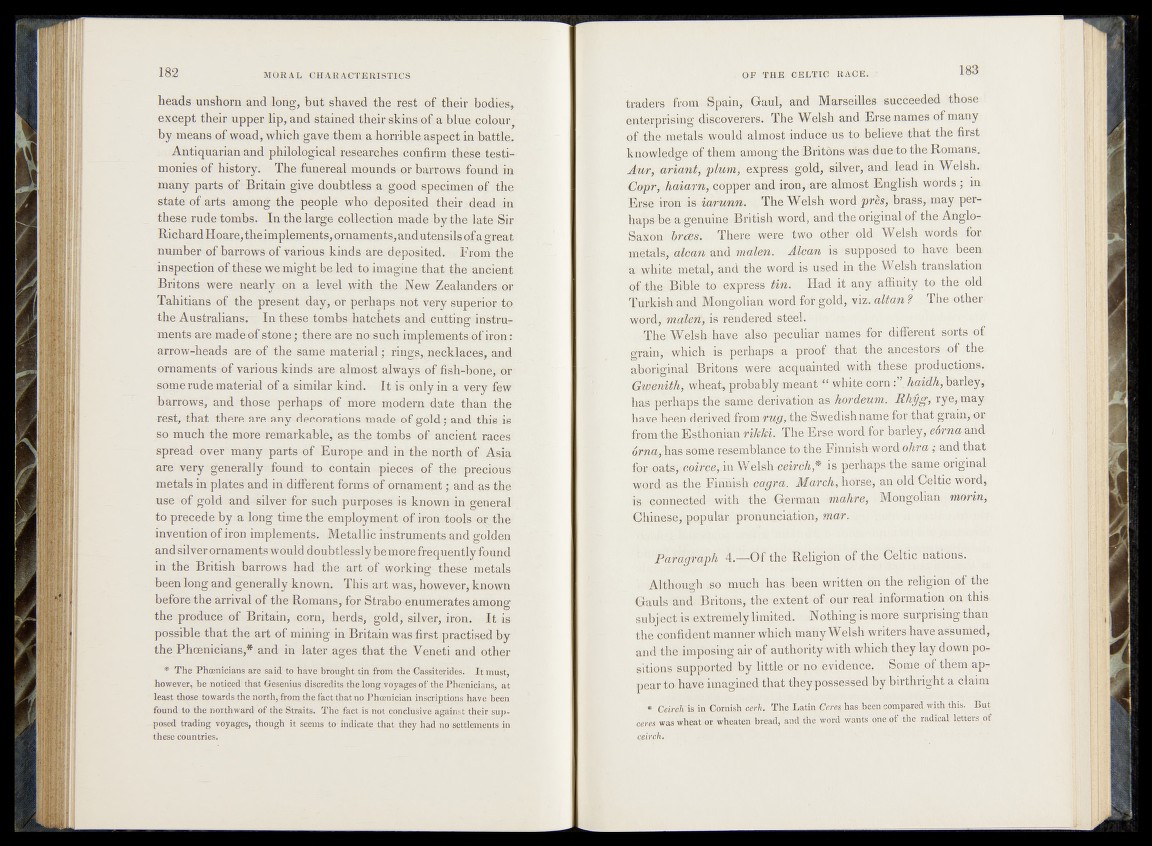
heads unshorn and long, but shaved tbevpst of their bodies,
except their upper lip, and stained their skins-of a blue .colour^
by means of woad, which gave them a horrible, aspect in battle.
Antiquarian and philologieal researches confirm these * tes%i
monies of history. T.he funereal mounds or barrows found in
many parts of Britain give doubtless a good specimen of the
state, of .arts among -the people who deposited their,.dead in
these rude tombs. In the large collection made by the late Sir
BichardHoare, the implements, ornaments, andntensilsofa great
number of barrows of various kinds are deposited. -, From the
inspection of these we might be lech to imagine that the ancient
Britons were nearly on a'level with the\ îfew Zealandep/Or
Tahitians of the present day, or perljaps npt very supériorité
the Australiansr In these tombs hatehets' and cutting instra-
ments are made of stone ; there are no.suchdmplements of iron :
arrow-heads are of the same material f: ring^,tnecklaces, a$d
ornaments n f various kinds are almost always of.fish-bone, or
some rudfemuterial of a similar kind. It i^bnly in a very few
barrows, and those perhaps of more modern date than the
rest, that there are any decorations made of g o ld ; and this Is
so much the more remarkable, as the tombs of ancient races
spread over many parts of Europe and in the north of Asia
are very generally found to contain pieces of the precious
metals in plates and in different forms of ornament É and as the
use of gold and-silver for such purposes is known in general
to precede by a long time the employment of iron tools o^fhe
invention of iron implements. Metallic instruments and golden
and silver ornaments would doubtlessly be more frequently found
in the British barrows had the art of working-these metals
been long and generally known. This art was, however, known
before the arrival of the Romans, for Strabo enumerates among
the produce of Britain, corn, herds, gold, silver, iron. I t is
possible that the art of mining in Britain was first practised by
the Phoenicians,* and in later ages that the Ve.neti and other
* The Phoenicians are said to have brought.tin from the Cassitefides. -JCt must,
however, be noticed'that Gesenius discredits the long voyages of the Phoenicians, at
least those towards the north, from the fact that no Phoenician inscriptions have been
found to the northward of the Straits. The fact is not conclusive against their supposed
trading voyages, though it seems tp-Indicate that they had no settlements in
these countries.
traders Spain,j-Ganly and Marseilles auceeeddi thoseenterprising
The Welsh and Ersenanms of many
Of tithe, met al-st sv#iuld .almost induceus toi/believe th a t the first
knowledge-of them^monghhe B rit bus.was dueto the Romans.
Aur, \ariant, tplumj express fg^ld, silver, and. lead in Welsh.
Gopr, haiam? copper and iron, arV almost English, words-; in
Bvsfi iron'as iarunn. The ’Welsh word pres, hrass,.may perhaps
B r itis h ^ the original of the Anglo-
.There other-old Welsh Swords for,
fa llen.' Al&a<n- iis*-^a|)|>osod to • havte b e »
a -white mi^t^lyiand-s-fche■ word*is -used in the Welsh translation'
qiflthe- Bible 4o «express tin. ^ a d it -the old;
Turkish and P< ^© lian word.fmgold; viz; altcm ? rThoMher-
WO pd ,, 'mc^errM^, .ren fefid ^eel •
The Welsh haver»j$ls©vpechhar nameS'for
grain, which is,, perhaps’ a - -proof fbhpty;the ancestors *ftf the.
aboriginal Prisons were, acquainted. with tjjetfr produ:0tioi\^< I
Gwemtb, wheat, probably meant •“ whitefcorn :\km d h , barley*
ha^pep%pgbh.e jsame derivation^&S'$&rde>um. Rhygj rye^may
have?be#i?digiijvod from rM^^j#h®|Sw.e.difsh name fordhatgrain / 0ij
ftli^iillhohian rihki. The Erse word ier hailey,- e6rn am^
omc^*basisome restmblanee to theiFinnish <word o/m^vand that
feiveaf;S3«enirce. in Welsh-eeirc&,* is perhaphdhe-.-same original
word- p,s the Finnish oagra. March-, hepse^ an old Celtic word,
i&. connected with the;Geiman mafore, Mongolia»): morin^
Chinese,.popular pronunciation, mar.
Paragraph 4.—-Of the Beligioh^S the.C^ltTc datidnlj^ '
Although,so -.muchfhas been written on the religion of thel
Gauls and iBritons, the extent-of one «real information ©n this,
subject.is »extremely limited. Nothingis more surprising than
the confident manner which many Welsh writers have-assumed,
and the imposing air of authority with which: they lay d own .positions
supported by little orinoysv-idence. Some of them appear
to have imagined that theypossessedby birthright aclaim
* CeixpKK™ Cornish cerh. ,The Latin Cephas been compared with fhib. But
ogres was wheat or wheaten bread, and theVord wants epe ot the radical letters y f
qgirch,